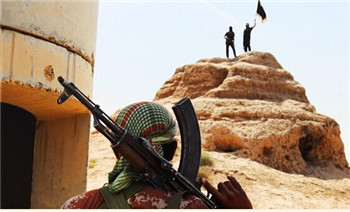在各国为寻找解决叙利亚内战的方式、打击“伊拉克和黎凡特伊斯兰国”(ISIS)逊尼派圣战组织及其在叙利亚和伊拉克的险恶权力基础的努力中,存在一个较大的漏洞——逊尼派。从位于纽约的联合国安理会(UN Security Council)到美国和俄罗斯牵头在维也纳举行的叙利亚会谈,外交官们苦苦建立的架构看起来就像瑞士奶酪一样千疮百孔。
There is a big Sunni hole at the heart of international efforts to find a way out of Syria’s civil war and turn the tide against the Sunni jihadis of Isis and their menacing power-base in Syria and Iraq. From the UN Security Council in New York to the Syria forum convened by the US and Russia in Vienna, the architecture that diplomats are struggling to erect looks as riddled as a Swiss cheese.
上月,在ISIS袭击了巴黎、5年内战将叙利亚大片领土夷为平地之后,联合国安理会一致同意军事打击ISIS。鉴于法国准备大干一场、美国和俄罗斯至少在表面上搁置了他们在从乌克兰到中东等问题上的分歧、就连英国也将其打击伊拉克境内ISIS的有限努力扩大至叙利亚,看上去该地区的领先外部势力正开始联合起来。在维也纳外交峰会上,各方商定了结束叙利亚冲突的暂定过渡方案。在这次峰会上,伊朗也在场,在9月份俄罗斯增援叙利亚之前,正是伊朗支撑着巴沙尔阿萨德(Bashar al-Assad)的政权。这些进展有什么实质性意义吗?
Last month, after the Isis attack on Paris but also after five years of fighting that has razed vast swaths of Syria, the Security Council issued a unanimous call to arms against Isis. With France on a war footing, the US and Russia ostensibly putting aside their differences from Ukraine to the Middle East, and even Britain extending its modest role in the anti-Isis fight in Iraq into Syria, it seemed as if the lead external actors in the region were starting to coalesce. The Vienna diplomatic summit, with the presence of Iran, which kept Bashar al-Assad’s regime alive until Russian reinforcements arrived in Syria in September, agreed unanimously on a tentative transition out of the Syrian conflict. Is there substance to any of this?
卷入叙利亚问题的两大主要势力——美国和俄罗斯,仍然处于对立面。美国总统巴拉克攠巴马(Barack Obama)领导着一个打击ISIS的联盟,至少在理论上得到逊尼派阿拉伯国家和土耳其的支持。俄罗斯总统弗拉基米尔渠京(Vladimir Putin)将自己置于由伊朗支持的什叶派轴心的领导位置,这个轴心的主要目标是力挺阿萨德政权(今年夏天该政权差点被主流反政府武装推翻)。不过,美俄所处的格局不利于任何中间地带存在,这将扩大本来已经很大的逊尼派漏洞。
The US and Russia, the two main powers embroiled in Syria, remain on opposite sides. President Barack Obama leads a coalition against Isis backed, at least in theory, by Sunni Arab states and Turkey. President Vladimir Putin has put himself at the head of the Iran-backed Shia axis, whose main goal is to prop up the Assad regime, which came perilously close to being toppled by mainstream rebels over the summer. Yet they are both trapped in a dynamic that is conspiring to eliminate any centre ground — widening that already large Sunni hole.
普京称,俄罗斯如今领导着之前被奥巴马搞得一团糟的打击ISIS的斗争。俄罗斯将绝大部分火力对准各个非ISIS的逊尼派反政府武装,这些叛军分别得到美国、沙特阿拉伯、土耳其和卡塔尔的撑腰。普京这么做恰恰摧毁了俄美据称正在物色的替代ISIS的势力。为了支撑以阿萨德的阿拉维派(Alawite,什叶派分支)为中坚力量的少数派政权,俄罗斯正在煽起吞噬和割裂黎凡特的宗派主义战火。
Mr Putin, who says Russia now spearheads the struggle against Isis that Mr Obama had bungled, has concentrated most of his fire on non-Isis, Sunni rebels, variously backed by the US, Saudi Arabia, Turkey and Qatar. That is destroying the alternative to Isis that Russia and the US are purportedly trying to identify. By bolstering a minority regime built around Mr Assad’s quasi-Shia Alawite community, Moscow is fanning the sectarian flames consuming and partitioning the Levant.
奥巴马接下了前总统乔治圠布什(George W Bush) 2003年入侵伊拉克留下的烂摊子。那场战争以毁灭性的宗派主义什叶派领导人取代了一个逊尼派暴政,使伊拉克四分五裂——为ISIS死亡邪教提供了滋生的条件。
Mr Obama inherited the debris of President George W Bush’s 2003 invasion of Iraq, which replaced a Sunni tyranny with ruinously sectarian Shia leaders and shattered Iraq into pieces — giving the Isis death cult its start in life.
然而,奥巴马在叙利亚问题上致命的举棋不定,与当年小布什在伊拉克的轻率徒劳之举在根本上如出一辙。奥巴马的拥护者称,面对一场错综复杂且不断演变的冲突,他置身事外是正确的。但这并不是他所做的。他曾呼吁推翻阿萨德政权,随后却不向主要由逊尼派组成的反政府武装提供实现这一点的手段。换句话说,不仅在伊拉克占人口少数的逊尼派觉得被剥夺权力,在叙利亚占人口多数的逊尼派也感觉遭到背叛。
Yet the Bush mix of recklessness and fecklessness in Iraq resurfaces in Mr Obama’s lethal ambivalence towards Syria. His defenders say he was right to stay out of an intractable, shape-changing conflict. But that is not what he did. He called for the downfall of the Assads but then held back from giving the mainly Sunni rebels the means to achieve it — adding to the sense of dispossession of the Iraqi Sunni minority the feeling of betrayal among Syria’s Sunni majority.
以美国为首的联盟在第一线打击ISIS的作战基本上依赖于伊拉克库尔德自由战士和叙利亚库尔德民兵组织,两者都是很有战斗力的武装力量,但只愿意保卫自己的地盘。五角大楼试图将叙利亚库尔德战士整编为一个叙利亚阿拉伯联盟——外加逊尼派部落战士和亚述基督教民兵组织——恰恰凸显了逊尼派阿拉伯的漏洞。
The US-led coalition’s position on the ground against Isis relies essentially on Iraqi Kurdish peshmerga fighters and Syrian Kurdish militia, effective forces that will nevertheless fight only for their own territory. The Pentagon’s attempt to rebrand the Syrian Kurd fighters as a Syrian Arab coalition — with the addition of Sunni tribal fighters and Assyrian Christian militia — merely spotlights the Sunni Arab hole.
美国及其盟友的说法是对的:如果阿萨德继续在位,就没什么希望争取到主流逊尼派支持打击ISIS。但是,从当前形势看,俄罗斯和伊朗也没错:如果阿萨德倒台,暂时没有可信的替代选择。有阿拉维派作为阿萨德家族的禁卫军,阿拉伯复兴社会党(Ba'athist)掌控的叙利亚被打造成了一个集权国家,几乎无法与阿萨德家族撇清关系。
The US and its allies are right that, if the Assads stay in place, there is little chance of enlisting mainstream Sunni sentiment against Isis. But, as things stand, Russia and Iran are not wrong in saying there is as yet no plausible alternative to fill a new vacuum if the Assads go. Ba’athist Syria was built as a security state almost impossible to disentangle from the Assad clan, with Alawites as its praetorian guard.
缺少主流逊尼派的领导成为整个地区的祸根,相反,这里产生了各式各样的逊尼派至上主义。ISIS——由伊拉克基地组织(al-Qaeda)和萨达姆侯赛因(Saddam Hussein)的军队(2003年后被美国解散)的复兴党军官组成的混合体——显然是毒性最强的。但是,较大的逊尼派势力——沙特阿拉伯、土耳其和埃及——都是这种毒药稀释后的版本,而非它们所号称的解药。
The lack of mainstream Sunni leadership is a blight across the region, which offers instead varieties of Sunni supremacism. Isis, a hybrid of al-Qaeda in Iraq and Ba’athist officers from Saddam Hussein’s army, disbanded by the US after 2003, is obviously the most virulent. But the big Sunni powers — Saudi Arabia, Turkey and Egypt — are diluted flavours of this poison to which they claim to be the antidote.
美国主要的逊尼派阿拉伯盟友沙特阿拉伯已向美国和俄罗斯表明,它的首要顾虑是什叶派的伊朗在整个阿拉伯世界影响力不断扩大。在谁是打击什叶派的最强有力的大锤的问题上,沙特的逊尼派分支、宗派主义的瓦哈比教派和ISIS相互竞争。由日益威权的总统雷杰普吠伊普埃尔多安(Recep Tayyip Erdogan)主政的土耳其,把领导新奥斯曼主义逊尼派复兴的关键视为与该国库尔德少数派重启战争。这两个大国都没有积极打击ISIS。
Saudi Arabia, Washington’s main Sunni Arab ally, has told both the US and Russia its overriding concern is the march of Shia Iranian influence across the Arab world. Its sectarian Wahhabi strain of Sunni Islam competes with Isis as to which is the more effective hammer of the Shia. Turkey under the increasingly autocratic presidency of Recep Tayyip Erdogan has seen its presumption of leading a neo-Ottoman Sunni revival boil down to a revived war with its Kurdish minority. Neither power is carrying the fight to Isis.
在2013年的政变推翻了民选的伊斯兰主义政府后,埃及再次沦为极权国家。该国号称是阿拉伯世界的知识强国,但事实是,其逊尼派千年学府爱资哈尔大学(Al-Azhar University)今年才从教学大纲中清除了早期伊斯兰教义中的糟粕,包括奴隶制、向非穆斯林征税、叛教和圣战,这些正是ISIS的惯用手段。
Egypt, after the 2013 coup against an elected Islamist government, has turned back towards a police state. Its presumption to being the Arab world’s intellectual powerhouse has to be measured against the fact that Al-Azhar, its millennium-old centre of Sunni learning, only this year excised from its curriculum early Islamic teaching on slavery, taxes due from non-Muslims, apostasy and jihad — the stock-in-trade of Isis.
中东迫切需要一种逊尼派的“反叙述”,顾及少数派以及个人的权利。只有那种意识形态才能挑战什叶派伊朗和ISIS标榜的逊尼派至上主义——使这个分崩离析的地区再度开始成为适宜居住的地方。
The Middle East desperately needs a Sunni counter-narrative that takes on board the rights of minorities as well as individuals. Only that will challenge the presumption of Shia Iran and the Isis brand of millenarian Sunni supremacism — and start reassembling a disintegrating region into some sort of liveable shape.
